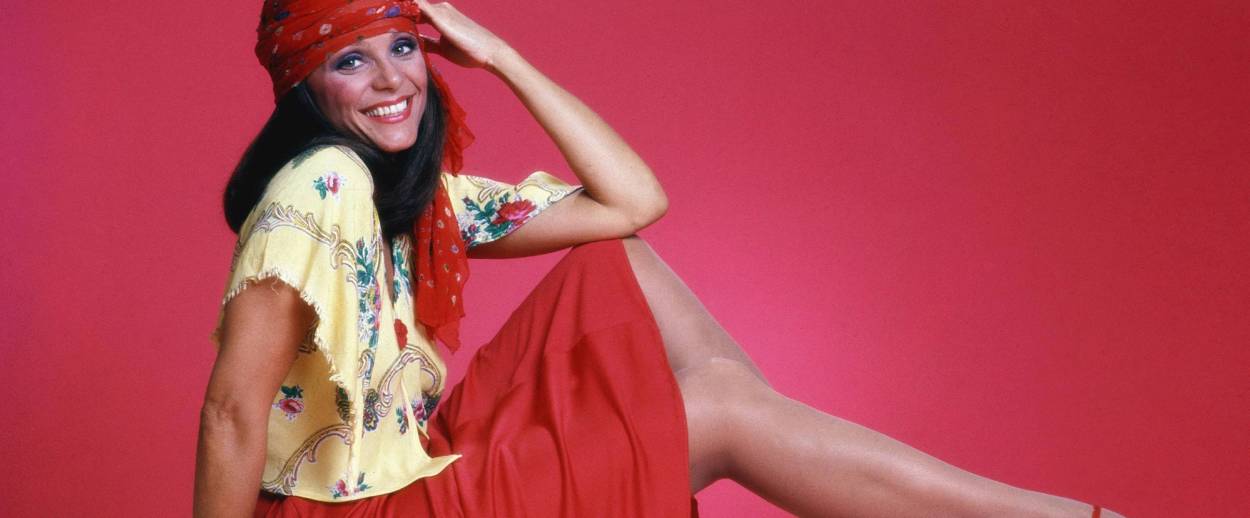Rhoda: ‘I Have Cancer’
Valerie Harper, facing her final battle, has left an indelible mark




As a child of the 1970s, I grew up with Valerie Harper. First, she co-starred on The Mary Tyler Moore Show, playing Rhoda Morgenstern, Mary’s upstairs neighbor—a Jew from New York (the Bronx, to be specific, as her accent made clear), a zaftig (well, only compared to Mary) single woman trying to make it on her own as a window designer in Minneapolis. And then, once it became clear that Harper’s character was too big to be confined to a secondary role as that show’s wise-cracking gal pal, she packed up her headscarves and came back east as the star of Rhoda. (“New York, this is your last chance!” she warned in the show’s opening, right before the uber-’70s ear-worm of a theme song kicked in.)
Between those two popular sitcoms, Harper played Rhoda—television’s most enduring Jewish character since Mrs. Goldberg—from 1970 until 1978, which happen to be what psychologists might call my “formative years.” And what did I learn from seeing her on the small screen every week—aside from how to hang strings of beads across a doorway? That Jews were just a regular part of the American cultural landscape, as American as Mary Tyler Moore herself.
True, Rhoda was more overtly Jewish on The Mary Tyler Moore Show: The Season 2 episode “Some of My Best Friends Are Rhoda” tackled anti-Semitism head-on, as goyishe Mary smartly defended her friend against a tennis-skirted bigot named Joanne (played with prim perfection by Mary Frann, who seemed so much nicer years later on Newhart). Any episode featuring Rhoda’s mother Ida (played by Nancy Walker, who was known to me as a child as that lady from the Bounty paper towel commercials) was sure to be dripping with Jewish content, like this one from Season 3.
By the time Rhoda moved back to New York, perhaps, being Jewish wasn’t such a big deal anymore—it’s just something in the air and the water there. (See, for instance, Seinfeld.) Once Rhoda wasn’t playing the counterpart to the very, very Protestant Mary in very, very Protestant Minneapolis, but rather a Jewish woman in a Jewish family in a Jewish city, maybe her Jewishness didn’t need to be underlined all the time. (Imagine, if you will, Fran Drescher playing The Nanny for a family that looked and sounded just like her.) Besides, it didn’t matter if Rhoda herself wasn’t quite as explicitly Jewish by the time she had her own show; her whole family reinforced the cultural signifiers at every turn, from Walker reprising her role as Ida Morgenstern, to the spectacular Julie Kavner (that’s Marge Simpson, to you youngsters) in her Emmy-winning turn as Rhoda’s sister Brenda. (Rhoda’s hirsute husband Joe, played by David Groh, awakened a whole slew of other feelings in me as a boy, but that’s a story for another day.) When I saw the Morgenstern clan on television, it wasn’t exactly like looking at my own family: Although my petite paternal grandmother bore a certain resemblance to Ida Morgenstern in stature and guilt-giving expertise, the similarities ended there. But the Morgensterns sure as hell looked like Jews. Jews I knew. Jews who, now, everyone knew. And loved.
Harper has played a lot of other roles in her life: Originally a stage performer, she returned to theater in recent years, playing Golda Meir in the 2005 national tour of Golda’s Balcony (perhaps the only role even more Jewish than the one that made her famous) and Tallulah Bankhead in Looped on Broadway in 2010. But she is forever known to most people as Rhoda; in case you needed proof, her 2013 autobiography is called I, Rhoda.
Since Rhoda was such an important part of my childhood, I’ve always had a soft spot for Valerie Harper, which is why today’s news that she has terminal brain cancer was so hard to read.
Funny thing is, considering how much she did for Jewish visibility on television—it’s impossible to imagine The Nanny, or Debra Messing on Will and Grace for that matter, without her—Harper isn’t Jewish. She did, however, tell an interviewer several years back that “I am Jewish in my heart.” I hear you, Rhoda. So am I. So am I.
***
Like this article? Sign up for our Daily Digest to get Tablet Magazine’s new content in your inbox each morning.
Wayne Hoffman is executive editor of Tablet Magazine.